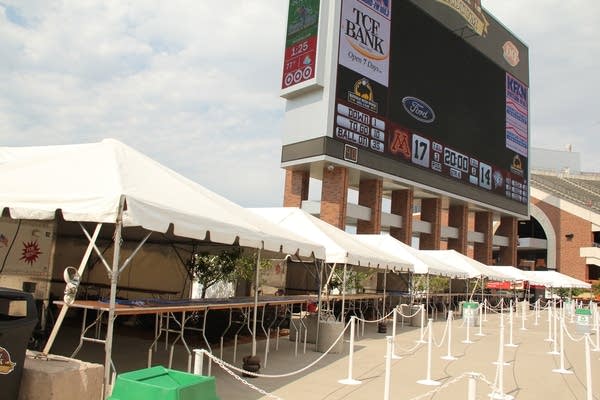Vikings ink deal with University to play in TCF Bank Stadium

The Minnesota Vikings have struck a deal to play at TCF Bank Stadium for two years, and the team has even made peace between Coke and Pepsi.
That detail is from the fine print of a new 70-page agreement between the team and the University of Minnesota that was unveiled today. It's a key step in giving the Vikings a field to play temporarily while the Metrodome is torn down and a new stadium goes up in its place.
It's taken a year of haggling over details such as what players can drink on the sidelines to the security deposit the Vikings must put down on their new digs. But the deal is in place to move the Vikings onto the University of Minnesota' stadium and President Eric Kaler welcomes the team to campus.
"I'm delighted that we're able to partner with the Minnesota Vikings to enable the facility to be used," Kaler said. "I think we've reached a very fair agreement to both sides. I think this is a classic example of a win-win.
Create a More Connected Minnesota
MPR News is your trusted resource for the news you need. With your support, MPR News brings accessible, courageous journalism and authentic conversation to everyone - free of paywalls and barriers. Your gift makes a difference.
The Metrodome is scheduled to be demolished early next year, after the Vikings finish their 2013 season. Their new, billion dollar stadium is scheduled to open in 2016. The team will play at TCF Bank stadium for the 2014 and 2015 seasons with an option for two more years if construction of the new stadium does not go as planned.
The Vikings are expected to pay about $5 million annually in game-day expenses, as well as another $3 million annually in rent. The team will chip in another $125,000 in cash and in-kind contributions to help ease the impact on surrounding businesses and residents.
"We intend to have a volunteer network," said Lester Bagley, Vikings vice president for public affairs. "Similar to what they have in downtown Minneapolis, the Downtown Improvement District, where they have folks walking around and kind of telling people where to go to ensure we're good neighbors."

It's a good deal, Bagley said.
"We think it's a fair and hard-fought agreement on both sides," he said.
Some of that fighting, it turns out, was even over what fans will be drinking in the stands.
The Vikings have an exclusive deal with Pepsi. The University of Minnesota has a long-term agreement that gives Coca-Cola the exclusive right to sell soft drinks on campus, dictating even what Gopher football players have available on the sidelines.
In the end, the two sides compromised. Gatorade, a Pepsi product, will be available to the NFL players on the sidelines as well as for the traditional post-game Gatorade shower for the winning coach.
But Coke will be the drink of choice in most of the rest of the stadium.
The alcohol policy is another matter. It took a state law to get beer and wine sales into TCF Bank stadium last year, after several dry years there.
NFL fans will be able to imbibe as soon as the Vikings move in.
A side deal is in the works with the Regents for alcohol sales, said Pam Wheelock, vice president for university services.
"Wine and beer would be available in the entire facility, and then wine and beer and hard spirits would be available in the premium areas," Wheelock said.
There are still some sticking points. The NFL wants a heated field, but both sides say they have not yet determined the best way to do that.
And with 15,000 fewer seats at the university stadium, it's unknown how many Vikings fans will get tickets for game days. Plans call for bleachers on the open end of the stadium, but it's not clear whether that's a practical solution.
